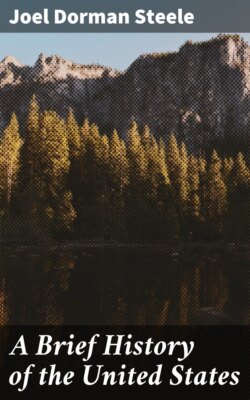Читать книгу A Brief History of the United States - Joel Dorman Steele - Страница 34
На сайте Литреса книга снята с продажи.
PLYMOUTH COLONY.
ОглавлениеTable of Contents
SETTLEMENT.—Landing of the Pilgrims.—One stormy day in the fall of 1620, the Mayflower, with a band of a hundred pilgrims, came to anchor in Cape Cod harbor. The little company, gathering in the cabin, drew up a compact, in which they agreed to enact just and equal laws, which all should obey. One of their exploring parties landed at Plymouth, as it was called on Smith's chart, December 21.
[Footnote: The exact number of the pilgrims was 102.]
[Footnote: This was Dec. 11, Old Style. In 1752, eleven days were added to correct an error in the calendar, thus making this date the 22d. Only 10 days, however, should have been allowed, and therefore the correct date is the 21st, New Style.]
Finding the location suitable for a settlement, they all came ashore, and amid a storm of snow and sleet commenced building their rude huts.
[Footnote: They were called Pilgrims because of their wanderings. About seventy years before this time the state religion of England had been changed from Catholic to Protestant; but a large number of the clergy and people were dissatisfied with what they thought to be a half-way policy on the part of the new church, and called for a more complete purification from old observances and doctrines. For this, they were called Puritans. They still believed in a state church, that is, that the nation of England was the church of England; and that the queen, as the head of both, could appoint church officers and prescribe the form of religious worship. They, however, wanted a change, and desired the government to make it to suit them. The government not only refused, but punished the Puritan clergy for not using the prescribed form of worship. This led some of them to question the authority of the government in religious matters. They came to believe that any body of Christians might declare themselves a church, choose their own officers, and be independent of all external authority. When they began to form these local churches, they separated themselves from the Church of England, and for this reason are called Separatists and Independents. One of these churches of Separatists was at Scrooby, in the east of England. Not being allowed to worship in peace, they fled to Holland (1608), where they lived twelve years. But evil influences surrounded their children, and they longed for a land where they might worship God in their own way and save their families from worldly follies. America offered such a home. They came, resolved to brave every danger, trusting to God to shape their destinies.]
[Footnote: The little shallop sent out to reconnoitre before landing, lost, in a furious storm, its rudder, mast, and sail. Late at night, the party sought shelter under the lee of a small island. They spent the next day in cleaning their rusty weapons and drying their wet garments. Every hour was precious, as the season was late and their companions in the Mayflower were waiting their return; but "being ye last day of ye week, they prepared there to keepe ye Sabbath." No wonder that the influence of such a people has been felt throughout the country, and that "Forefathers' Rock," on which they first stepped, is yet held in grateful remembrance.]
THE CHARACTER of the Pilgrim settlers was well suited to the rugged, stormy land which they sought to subdue. They had come into the wilderness with their families in search of a home where they could educate their children and worship God as they pleased. They were earnest, sober-minded men, actuated in all things by deep religious principle, and never disloyal to their convictions of duty.
THEIR SUFFERINGS during the winter were severe. At one time there were only seven well persons to take care of the sick. Half of the little band died. Yet when spring came, not one of the company thought of returning to England.
THE INDIANS, fortunately, did not disturb them. A pestilence had destroyed the tribe inhabiting the place where they landed. They were startled, however, one day in early spring by a voice in their village crying in broken English, "Welcome!" It was the salutation of Sam'-o-set, an Indian whose chief, Mas-sa-suit, soon after visited them. The treaty then made lasted for fifty years. Ca-non'-i-cus, a Narraganset chief, once sent a bundle of arrows, wrapped in a rattlesnake skin, as a token of defiance. Governor Bradford returned the skin filled with powder and shot. This significant hint was effectual.
[Illustration: WELCOME—PLYMOUTH, 1621]
The progress of the Colony was slow. Their harvests were insufficient to feed themselves and the new-comers. During the "famine of 1623," the best dish they could set before their friends was a bit of fish and a cup of water.
[Footnote: As an illustration of their pious content it is said that Elder Brewster was wont over a meal consisting only of clams to return thanks to God who "had given them to suck the abundance of the seas, and of the treasures hid in the sands."]
After four years they numbered only 184. The plan of working in common having failed here as at Jamestown, land was assigned to each settler. Abundance ensued. The colony was never organized by royal charter; therefore they elected their own governor, and made their own laws. In 1692, Plymouth was united with Massachusetts Bay colony, under the name of Massachusetts.
